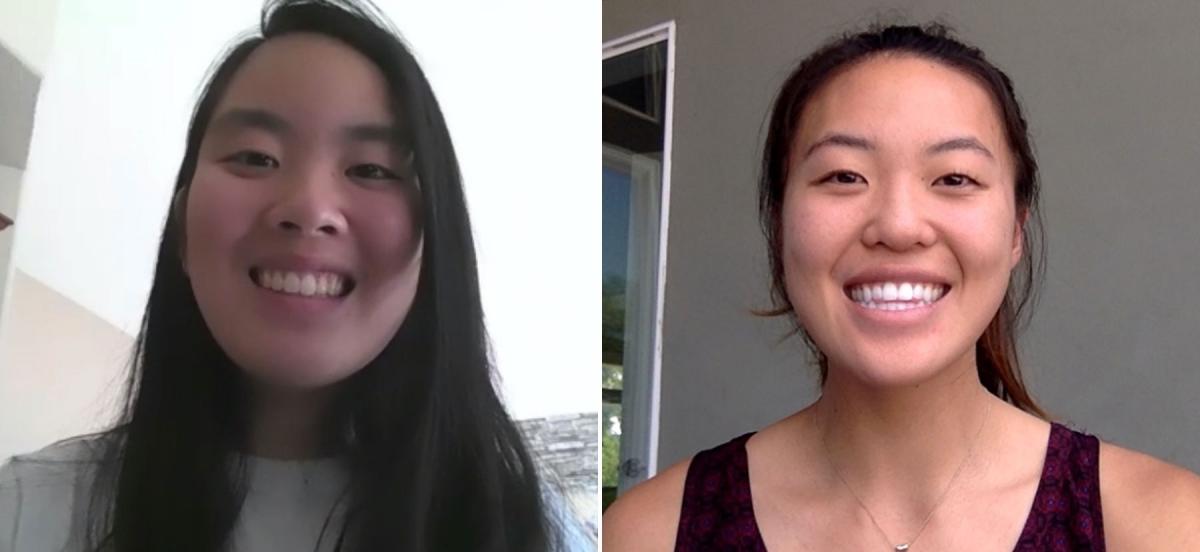Bentbox Takes Aim at Takeout Container Waste

This summer, Margaret Chen '21 (left) and Sara Matsumura '20 pivoted their Haverford Innovations Program Incubator project from creating sustainble, portable packaging to developing a return system for reusable containers that could reform the system that creates so much wasteful packaging in the first place.
Details
Margaret Chen ’21 and Sara Matsumura ’20 spent the summer creating a return system for reusable fast food containers as a part of Haverford Innovation Program’s Incubator.
Tired of bringing restaurant leftovers home in styrofoam and plastic containers that she knew would linger in landfills and pollute oceans, Sara Matsumura ’20 knew there had to be a more sustainable way to transport food. The chemistry major and environmental studies minor hoped to be able to create a reusable container that people could take to restaurants to pack up their extra portions, so she joined with Margaret Chen ’21, an environmental studies major with a sustainable design concentration, to pitch such an idea to the Haverford Innovation Program’s Summer Incubator.
"We are both incredibly passionate about sustainability and ways we can provide environmental justice to our communities and natural environment,” they said.
Their project, dubbed bentbox, was one of two teams accepted to this year’s incubator, and they planned to spend the summer in VCAM’s Maker Arts Space experimenting with food-safe materials, prototyping their reusable container, and practicing origami (in the hopes that their container could be foldable and portable).
COVID-19 and a move to virtual work in Matsumura and Chen’s separate west coast homes rendered those plans, unfortunately, moot. In addition to not being able to physically be in the Maker Arts Space on campus, "their work became more complex, having to navigate a changed world with new concerns, attitudes, and regulations in the food service industry," said HIP Associate Program Director Shayna Nickel, who guided this summer’s incubator teams remotely.
Bentbox then pivoted dramatically. Instead of becoming product designers, fabricating the perfect sustainable, portable packaging, they looked toward reforming the system that creates so much wasteful packaging. Bentbox became a return system for reusable containers that can be used by fast food chains and that can encourage better customer behavior.
“By signing up with bentbox, restaurants and their customers can reduce their waste by using our containers for takeout and returning them to bentbox receptacles for future discounts,” said the team in a joint statement.
Customers “check out” the reusable containers via the bentbox website when provided one by a participating restaurant. After enjoying their meal, customers can return their container by scanning it at bentbox return receptacles around town, earning points that lead to discounts. The bentbox team then picks up and washes the containers at an industrial washing facility and restocks the partner restaurants.
“We needed to disrupt the single-use takeout industry and create a super easy transition to sustainable habits for customers, especially college students and young professionals,” they said. “For the last four weeks, we’ve been working hard to pivot from our original idea, and embrace our new concept through extensive research, customer interviews, and scenario building.”
“The incubator is designed to allow students to enter with no skills or experience relating to their venture or idea,” said Nickel. “This makes their work challenging… [and] this year’s teams probably faced more impediments due to the pandemic that we had to work to overcome. What they’ve accomplished in this short period of time is incredibly impressive, and I hope they feel proud of what they’ve achieved thus far.”
In only a few weeks, the bentbox team has built an attractive and user-friendly website, begun work with College staff on creating tech-capable public container receptacles, and started talks with Haverford Dining Services about using their industrial washing facility for their containers. They are now planning a pilot program with the local restaurant community near Haverford’s campus scheduled for spring 2021.
"During the pandemic, we want to support restaurants that have been a staple for us Haverford students over the past few years," they said. "We hope to help them gain more business during these challenging times and provide a free first-hand experience at an affordable and sustainable reusable takeout system."
Both Matsumura and Chen are applying to graduate school in the fall, so the future of bentbox, beyond the pilot program, is unknown. But both are grateful for the HIP Incubator and the confidence it gave them as entrepreneurs and the inspiration it gave them to continue pursuing their sustainability goals.
“Overall, this innovation process has greatly strengthened my own passion to create and solve everyday problems,” said Matsumura. “I plan to continue working with other startups in the future, specifically ones battling climate change and sustainability with science.”



